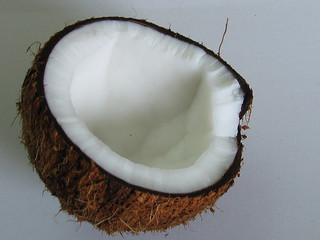Polyunsaturated fat. An excellent source of DNA-disrupting free radicals, thyroid-killing omega-6 fatty acids, and metabolism-squashing inflammation. Better load up on that oily “buttery spread” that’s jam-packed with the stuff, right? I mean, hey — the American Heart Association says so!
Well, dear readers, I’m quite confident that you know better than to follow advice like that. Especially after we spent some quality time last week dissecting the evils of excessive polyunsaturated fat in our modern diet with this post on PUFAs, and the discussion that followed.
A few people commented and contacted me saying that they were more than a little freaked out by this part:
Oh and, wanna know another fun little factoid about how badly the consumption of these PUFA oils have affected us? Polyunsaturated fats actually accumulate in your cells and can be passed on from generation to generation. So, for over a century now, we’ve been experiencing the cumulative effects of all that excess PUFA on every cell of our bodies — inflammation, thyroid disfunction, leptin resistance and all. Thanks so much for switching to Crisco, Grandma! It takes years and years to flush out PUFA from your system, even if you cut your consumption of it right away.” PUFA: What is it, and Why Should it Be Avoided?
Um, yikes! Kinda makes you wonder how you could counteract the toxic effects of PUFA while they set up camp in your cells for years to come, or even if there might be ways to help flush them out.
Unfortunately, the half-life of fats in human adipose tissue is about 600 days, which means that significant amounts of polyunsaturated fats may still be present in your cells over four years after they were consumed. Gross!!
Real Food to the Rescue: Fight PUFAs with Coconut Oil
Thankfully, if you’re relatively new to the wonderful world of saturated fat, and you’ve been a PUFA-abuser in the recent past, there are some simple ways to do a little damage control. Dr. Raymond Peat, a well-known pro-real-food researcher with a Ph.D in biology and physiology, is one of the leading experts in the field today on thyroid functioning, metabolic health, and the effects of polyunsaturated fats on the body.
Dr. Peat says that simply adding a good, healthy dose of coconut oil to your daily diet is an excellent way to combat the effects of leftover PUFAs stuck in your cells.
An important function of coconut oil is that it supports mitochondrial respiration, increasing energy production that has been blocked by the unsaturated fatty acids. Since the polyunsaturated fatty acids inhibit thyroid function at many levels, coconut oil can promote thyroid function simply by reducing those toxic effects. It allows normal mitochondrial oxidative metabolism, without producing the toxic lipid peroxidation that is promoted by unsaturated fats.” Dr. Ray Peat, Ph.D

Coconut oil also helps to reduce oxidative damage from the free radicals present in polyunsaturated fat in the body. That’s because coconut oil has beenshown to act as a very powerful antioxidant.
Dr. Peat explains why in his article on coconut oil:
“Coconut oil that has been kept at room temperature for a year has been tested for rancidity, and showed no evidence of it. Since we would expect the small percentage of unsaturated oils naturally contained in coconut oil to become rancid, it seems that the other (saturated) oils have an antioxidative effect: I suspect that the dilution keeps the unstable unsaturated fat molecules spatially separated from each other, so they can’t interact in the destructive chain reactions that occur in other oils. To interrupt chain-reactions of oxidation is one of the functions of antioxidants, and it is possible that a sufficient quantity of coconut oil in the body has this function.”
Vitamin E for Pro-Thyroid and Anti-PUFA Effects
Another important dietary addition to counteract the anti-thyroid function of polyunsaturated fat is vitamin E, which is also an antioxidant. But popping a vitamin E capsule might not be the best way to get it.
Dr. Peat says that vitamin E supplementation should only be used “sparingly” because “the quality of commercial nutritional supplements is dangerously low.”
So of course, the natural solution to vitamin E supplements, is vitamin E found in… food! Novel concept, right? Some of the foods highest in vitamin E include grass-fed butter, grass-fed meat (four times higher in E than grain-fed), pastured eggs, and quality seafood.
But your need for vitamin E could even be lessened, if you’re using coconut oil, according to Dr. Peat.
“It is well established that dietary coconut oil reduces our need for vitamin E, but I think its antioxidant role is more general than that, and that it has both direct and indirect antioxidant activities.”
So, how much coconut oil do you need? Dr. Peat says that even just a tablespoon of it per day can help provide you with the pro-thyroid, pro-metabolic, anti-oxidative effects coconut oil can offer. Combined with antioxidant and vitamin E-rich grass-fed animal foods, it sounds like those pesky PUFAs stuck inside you don’t have to be quite so menacing, after all. Just be sure to keep away from them as best you can from now on!
Check out EatWild.com, LocalHarvest.org, and RealMilk.com for farms near you that provide grass-fed foods.
And, you can find quality coconut oil, both extra-virgin, and the cheaper (but equally beneficial for these purposes) expeller-pressed kind, right here.
Also, be sure to check out one of my favorite resources for metabolic health, Diet Recovery, to learn more about the effects of the right and wrong fats on your metabolism, and how you can fix it.





This is so encouraging to hear! I was definitely a “PUFA-abuser” in my pre-Real Food life. I am constantly amazing at how our bodies can rejuvenate and repair with the right kinds of food! I have been getting my daily doses of coconut oil, as well as plenty of grass fed butter and lard. I didn’t know that grass fed meats and butter were a source of vit. E. That is good to know!
Thanks, Lauren! It really is amazing how we can heal with the right food. And I think we were probably all PUFA-abusers by default, before finding real food! I’m just so thankful that I’m learning this stuff while I’m young and know the right choices to make from now on!
LOVE this article, Emily!
I avoid PUFAS like the plague, except I know that I get nailed at restaurants :(.
I believe that one day they’ll be outlawed 🙂 LOL! No, but I do hope that restaurants will be forced to change because of empowered people saying no. Your blog helps the cause!
XO,
Genevieve
Thanks so much, Genevieve! You’re right — the more people that know about this, the more things will change. Just like how everyone knows to avoid trans fats now, I think eventually we’ll get back to using traditional fats, even in restaurants! And veggie oil should TOTALLY be illegal. Haha! 🙂
I bought Organic Coconut Oil at the store and we LOVE it. It was our first time using it and WOW!!!!
That’s so awesome!! 😀
Wow so much still to learn! I have been using coconut oil but I don’t really like coconut, so this week I got the refined organic oil from Spectrum Naturals. They claim it has been tested and loses no benefits but I would like a second opinion! Anyone have one? I will use this more but I want to know if I am getting the benefits and if not I need to switch back. Thanks!
Refined/expeller-pressed coconut oil is completely fine! In fact, it’s what Dr. Peat recommends because it is easier to digest than virgin coconut oil. And it’s cheaper! Yay. 🙂
oh yay. so glad for your answer on this, as I too find the virgin coconut oil a little gag-worthy for ‘taking’ as a tbp. Hadn’t been able to find a comprehensive answer. Thanks 🙂
Emily, I’m posting this one to FB too! You are right up there with Ann Marie & Matt as one of my favorite bloggers! Thanks!
Jacque
What a great compliment! Thank you so much, Jacque. 🙂
As a recovering PUFA abuser I can’t tell you how amazing this news is! Thanks so much for posting this! Love your blog and appreciate your work.
Thank you so much, Elaine! That is so nice to hear.
Is it really as simple as that? That’s such good news! I don’t always like the taste of coconut oil. I buy MCT oil and use it for homemade mayo and put it in bulletproof coffee. It stays liquid and has no flavor, which is why it is good for mayo. It is more processed than raw coconut oil but it contains more medium chain triglycerides. I’m not sure if that oil counts in this protocol.
I have no PUFA oils at all at home, unless you count chicken fat. However, we eat out sometimes. I try to avoid commercial dressings and I ask for butter but a lot of the cooking oils used are PUFAs.
I don’t think I’ve come across MCT oil, is it just refined coconut oil? Dr. Peat actually recommends the refined/expeller-pressed coconut oil over the extra virgin kind, mostly because it’s more digestible, but still offers all the antioxidant benefits of the coconut. Maybe yours is a little different since it stays liquid, which I know refined coconut oil does not. I’m gonna try to get my local co-op to order me a big 5 gallon bucket of the refined oil cause it’s dirt cheap! And then just use the virgin kind for when I actually want the coconut flavor.
Thanks for the interesting article! Can you please explain to me, practically / logistically / scientifically… How our cells pass on to the next generation? Thanks so much!
I am not sure I’d like to cook my food in coconut oil. Foods cooked in it carry that terrible stink.
A friend of mine who has sued it for cooking ever since she can remember has no problem eating it though I find it difficult to push most foods at her place down my throat.
Wouldn’t it be much better to use olive oil instead?
No, it wouldn’t be. Olive oil has little saturated fat and a good chunk of polyunsaturated, which oxidizes and turns rancid with exposure to heat, light, and oxygen. Plus, it’s very expensive. (The cheap “extra-virgin” olive oil you find in stores is anything but. Google “extra virgin olive oil fraud.”)
I totally understand not wanting the coconut taste in all your food, though! You can use refined, or expeller-pressed, coconut oil instead. It’s tasteless, but still offers all the thyroid and metabolism-supporting benefits of virgin coconut oil.
Should I take omega 3s? I heard these were supposed to be REALLY good for us but they are part of the polyunsaturated fat family. Im confused 🙁 I have a slow thyroid and I think polys are bad for slow thyroids.